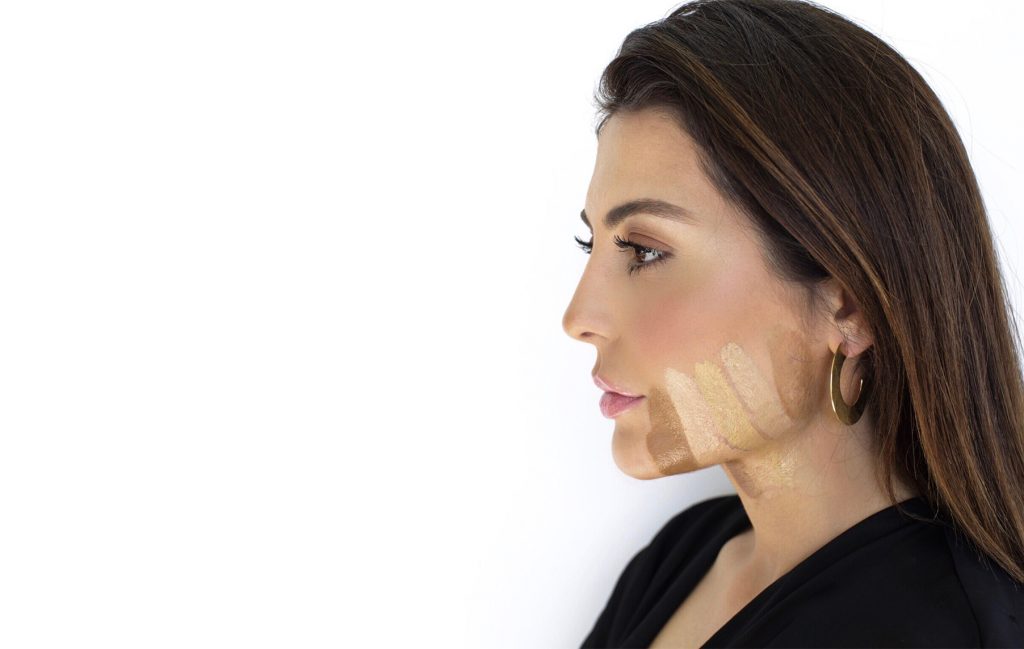With the vast selection of shades, finishes, and coverage levels available, foundation is just as easy to customize as your coffee order. This is exactly why it is one of the hardest makeup products to get right.
Obviously, you want a foundation shade that complements your skin — which can be hard to achieve when most makeup aisles have less than ideal lighting for swatching and mirrors smaller than most compacts.
Even if you’re able to avoid that dreaded mask-like foundation line on your neck by getting professionally shade-matched, there’s a host of other concerns like finish, texture, coverage, and formula that factor into finding the perfect foundation. In this article, we will break down everything you need to consider when shopping for your new go-to foundation.
1. Find Your Perfect Shade
Sure, there’s a lot of space for swatching foundations on your forearm, but the skin on this part of your body is a lot darker than your face. Instead, apply potential shades to your chest to see if they are right. This doesn’t have to be an exact match, but maybe slightly lighter because the colour is going to shift throughout the day. Foundation oxidizes with wear, and naturally gets darker with the mixture of elements and the oils on your face.”
Alternatively, you can test shade options on your face. Find a spot towards the center of your face and blend out towards the hairline so you match the sides of your cheeks and down the middle of your neck. If your neck is lighter than your face and you don’t want your face to be as pale, choose one shade lighter than your face so it’s comparable. (You can always ‘warm up’ the face with bronzer if your complexion still appears light.) This way it’s not too light or that much warmer than your neck. Remember that whatever method you choose, it’s important to test foundations in good natural lighting.
2. Don’t Forget About Your Skin’s Undertones
Unless you want to colour correct, don’t fight against your skin’s natural undertones. If you have a warm complexion, go with a shade that has yellow undertones, and if your complexion is on the cool side, a foundation with pink undertones is your best bet.
3. Know What Coverage Level You Need
If you hate wearing makeup, you’re going to think a full-coverage foundation feels heavy. That’s why understanding the look of every coverage level is the key to picking the right one for your needs.
If this sounds like you, pick a more sheer foundation when you’re not sure exactly what kind of coverage you need. When you want a long-wear foundation that doesn’t require mid-day touch ups, or have acne or discoloration, opt for a full-coverage foundation.

4. Consider Your Skin Type
Matte or dewy? That’s the question to ask before swatching foundation shades. And your skin type is an important factor when it comes to choosing finishes. Dewy foundations tend to work best on normal to dry skin types. Matte foundations are usually more suitable for combination to oily skin types.
Experts recommend using a satin finish instead of matte on mature skin. More mature skin can get away with matte but again, just like dewy skin can emphasize flaws and wrinkles, so can matte foundations because the skin has no dimension.
5. Adapt Your Shade to the Current Season
It’s true: You won’t be able to stick to one foundation shade year-round. Why? Well, our skin tends to warm up in the spring-summer while we’re more active outdoors and in direct sunlight, even if you’re wearing sunblock every day. And the inverse is true in winter, when we are less active and are exposed to less sunlight.
6. Take Advantage of Virtual Try-On Tools
Sure, germs are a good reason to opt for a virtual makeup try-on tool rather than use in-store testers. However, trying foundation shades on at home ensures you buy the right shade on the first try and allows you to see what the foundation will look like in selfies. A number of brands and retailers have created their own tools, including juggernauts like L’Oréal Paris, Ulta Beauty, Chanel, MAC, and NYX Cosmetics, to name a few.
We hope these tips will help you find the perfect foundation for your skin. Are there any other tips that you would like to share? Be sure to drop them in the comments below.


